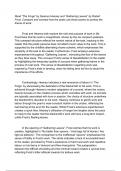Read “The Forge” by Seamus Heaney and “Gathering Leaves” by Robert
Frost. Compare and contrast how the poets use these poems to portray the
theme of work.
Frost and Heaney both explore the role and purpose of work in life.
Frost fears that his work is insignificant, shown by the six compact quatrains.
This cramped structure reflects the narrow nature of the task, implying to the
reader that the poetic persona does not attach much value to the work. This is
supported by the childlike alternating rhyme scheme, which emphasises the
simplicity of the task to the reader. Furthermore, Frost employs extensive
enjambement throughout “Gathering Leaves”, mimicking the flow of the leaves
as they blow away. This conveys Frost’s sense of dissatisfaction to the reader
by highlighting the temporary quality of success when gathering leaves in the
process of rural work. This sense of dissatisfaction regarding work was
inspired by Frost’s trials in farming, when his failing farm led him to doubt the
importance of his efforts.
Contrastingly, Heaney indicates a real reverence of labour in “The
Forge” by showcasing the dedication of the blacksmith to his work. This is
achieved through Heaney’s modern adaptation of a sonnet, where the octave
heavily focuses on the creative process which coincides with work. As sonnets
are typically associated with love or passion, the choice of structure underlines
the blacksmith’s devotion to his work. Heaney continues to glorify work and
labour through the poem’s near-constant rhythm in the octave, reflecting the
hammering at the anvil for the reader. Whilst Frost’s extensive enjambement
creates a quick flow, Heaney’s utilisation of longer line lengths slows the pace
to imply to the reader that the blacksmith’s work will have a long-term impact,
unlike Frost’s fleeting leaves.
In the opening of “Gathering Leaves”, Frost worries that his work is
useless, highlighted in “No better than spoons, / And bags full of leaves / Are
light as balloons”. The comparison to the ineffectual “spoons” emphasises the
sense of futility in Frost’s work. The simile indicates a lack of accomplishment
to the reader, provoked by Frost’s experience of hard rural work and repetitive
labour on his farms in Vermont and New Hampshire. The juxtaposition
between the difficult shovelling and the minimal reward creates a cynical tone,
reflecting Frost’s bitter attitude towards his tedious work.
, Opposingly, Heaney admires the beauty and productivity of rural tasks.
This is established in the opening line with “All I know is a door into the dark”.
Heaney alludes to the title of his anthology, “Door Into The Dark”. This
highlights the sense of mystery created by the craft of the blacksmith,
emphasising the intrigue and discovery found in the work to the reader.
Similarly to Frost, Heaney uses a first-person narrative to emphasise the
emotions of the persona. However, whilst Frost uses personal pronouns to
demonstrate his frustration to the reader, Heaney uses personal pronouns to
demonstrate the fascination with the blacksmith’s work that he felt as a young
boy. Heaney continues to display the importance of the work by describing the
“hiss when a new shoe toughens in water”. The sibilance creates a sensuous
experience, reflecting the many sounds in the workshop. This is supported by
the use of onomatopoeia, which conveys a sense of excitement to the reader,
demonstrating the fulfilment found in the labour. The symbolism represents
the formation of new ideas through labour, reflecting the fundamental
importance of having mental occupation found in work.
Moreover, Frost and Heaney have differing opinions regarding the
outcome of labour. Frost laments that his work will produce nothing worthwhile
in “But the mountains I raise / Elude my embrace”. Frost uses religious
allusions in relation to several parables about mountains and the strength of
Creation. Through the metaphor, Frost indicates his dismay that his work will
ever create something on the level of God’s Creation and that he will never
produce something worthy of the world that he lives in. The hyperbole of the
piles of leaves being described as “mountains” highlights the endless,
seemingly great, nature of gathering the leaves, contributing to the stanza’s
pessimistic tone. The assonance emphasises the sharp rhythm of the poem,
reflecting Frost’s dejection to the reader. The personification of the piles
indicates to the reader that every purpose of the task will “elude” Frost, leaving
him dissatisfied with his work.
Heaney offers a different perspective, implying to the reader that the
work’s productivity is its own reward. Heaney argues that the imagination
found in the labour can contribute to a greater purpose, and the creation and
betterment of the world. This is evident in “Set there immovable: an altar /
Where he expends himself in shape and music”. Like Frost, Heaney alludes to




